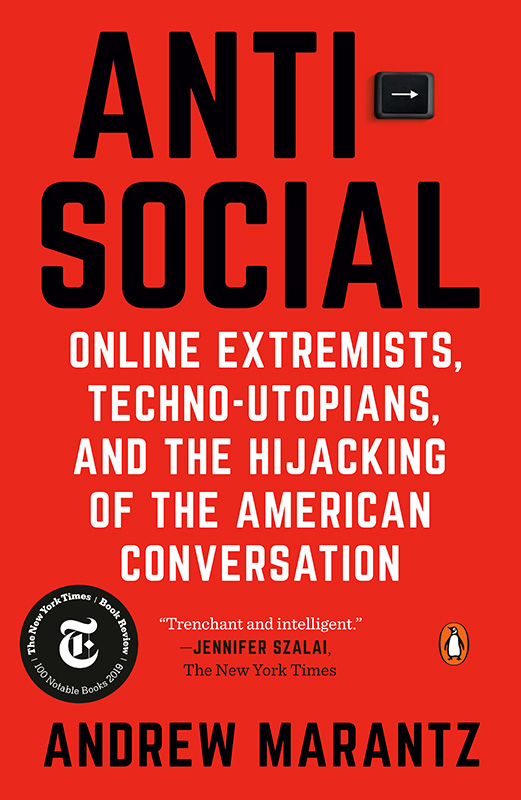When Andrew Marantz, a New Yorker staff writer, attended the “DeploraBall” on the eve of Donald Trump’s inauguration in 2016, he didn’t expect there to be good company. But he didn’t know the extent to which the company would live up to its eponym, either.
“Every time I reassessed how I truly felt about the demi-celebrities, I discovered that, in my heart of hearts, I was not at all confused,” Mr. Marantz writes in his new book, Antisocial: Online Extremists, Techno-Utopians and the Hijacking of the American Conversation. “I found them deplorable.”
A journalist who had spent much of the prior decade chronicling the “web savvy bigots,” “soft-brained conspiracists,” “grifters” and “opportunists” who were responsible, in large part, for catapulting Donald Trump into the Oval Office, Mr. Marantz had set out to write a book in the election’s aftermath as America reckoned with an internet insurgency that had left traditional, mainstream media outlets in ashes.
While the tech giants and social media overlords like Facebook, Twitter and Reddit had provided the podium, Mr. Marantz said in a conversation with the Gazette that he wanted to explore the voices that had grabbed the mic.
“Who are the people who are reshaping the world via internet algorithm?” Mr. Marantz said. “Obviously the big companies, the Facebooks and the Googles and the Amazons of the world, were reshaping commerce in these very important ways . . . but I also was interested in the people who were supplying the means and trying to carve out a living within this unique ecosystem.”
That was before Donald Trump’s election, when the stories he wrote for the New Yorker about the internet and its media celebrities were generally cultural or economic in nature. By 2015, they became political.
“I was one of these people who was sort of raining on everyone’s parade at every sort of lefty Brooklyn party, being like, you guys, Trump really has a shot,” he said. “As Andrew Breitbart famously said, politics is downstream from culture. I also think the stream flows the other way, but it’s just to say that they’re connected.”
“There’s something to be said about how we got to this perilous moment,” he added.
That election moment serves as the fulcrum for Antisocial, as Mr. Marantz traces the 21st Century media figures who helped bring Donald Trump to power, from their early days on society’s periphery to their apotheosis at the Deploraball, held, unironically, at the National Press Club in Washington D.C.
The characters range from Mike Cernovich, a bulky, anti-feminist blogger and proponent of the “Manosphere” movement who rose to prominence on the heels of a book called “Gorilla Mindset,” to Emerson Spartz, a self-proclaimed “virologist” who started a business by monetizing, among other things, cat GIFs, to Cassandra Fairbanks, a former anti-fat shaming advocate and one-time Bernie Sanders fangirl who by 2016 was wearing Pepe the Frog pins and railing against government mind control.
The book describes them non-monolithically, their shared adoration for Donald Trump belying the fact that none of them were particularly ideological, focused more on virality, or virility, than on political philosophy. Mr. Marantz said he was surprised by the number of women, people of color and queer people he met who shared these views.
Mr. Marantz said he often had to hold his tongue during interviews.
“I never really wanted to throw a punch, but I had times where I was like, I can’t really sit through another cringy race joke. This is just so exhausting,” he said. “Sometimes, you don’t say what you’re thinking . . . you save it for the page.”
As the pages of Antisocial progress, Mr. Marantz forces the mask to slip, astutely juxtaposing his subjects with the reality of their movement. These are people who have come up with an acronym so that they can code speak about the “Jewish Question,” yet one of their greatest insecurities, throughout the book, is whether Mr. Marantz will call them neo-Nazi’s. They rail against censorship, yet decry Twitter posts considered too extreme and ban the white supremacist Richard Spencer from their events, which feature far more Bob Dylan than Kid Rock.
And yet, these “meta-media insurgents” aren’t truly representative of the voters across the country who brought Donald Trump to the presidency, and by appearances would be just as out of place in rural Ohio as they are in D.C.
“There’s a pretty big difference, the way I see it, between people who have chosen to tear at the seams of the fabric of our democracy as their choice of what to do in life, and people who are just your run-of-the-mill Trump supporter,” Mr. Marantz said.
By the book’s close, it is clear the insurgents who transformed the world’s media landscape also transformed a young, rebellious journalist, who happens to write for an institution considered to be that landscape’s most stolid bulwark. In the book, Mr. Marantz describes a late-90s concept that came out of a Libertarian think-tank called the Overton Window. Ideas in the center of the window are universally acceptable, while the panes represent more controversial opinions. Outside the window are ideas not just unpopular, but unthinkable.
Mr. Marantz says in the book that the thing he found supremely irksome about the Deplorables, who wanted to not just shift the window, but “smash it and rebuild it in their image,” was that they forced him to think like an “establishment shill.”
“It’s something I still struggle with,” Mr. Marantz said. “All things being equal, it’s cooler to be throwing bombs from outside the castle, rather than sitting inside the castle going, we should fortify these walls . . . it’s just that I don’t believe in building an entire identity in opposition to that, either.”
Antisocial doesn’t seek to truly understand the bomb throwers but it helps to understand the ruins they have left in their wake.
“There was this misconception, in the peak of gatekeeper media in the United States in the ‘50s and ‘60s, that you could have this objective, voice of God coming from nowhere, and that would be the mainstream media, and they would be received from on-high as a neutral, final arbiter of truth,” Mr. Marantz said. “And now that illusion is totally gone.”
Andrew Marantz takes part in a panel discussion with Jelani Cobb, Cecilia Kang, on Friday at the Martha’s Vineyard Museum titled Can Journalism Survive. The event is part of the Vineyard Gazette’s 175th anniversary celebration and is moderated by Don Baer. The talk begins at 6 p.m. with a reception afterward. Mr. Marantz also takes part in a discussion with Cecilia Kang on Saturday at the Chilmark Community Center, beginning at 1:30 p.m.








Comments
Comment policy »